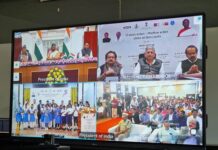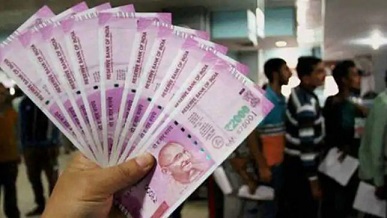By Our Correspondent
NEW DELHI/BHUBANESWAR: The Government has implemented a judicious mix of fiscal and monetary policies to mitigate the negative impact of COVID-19 on the economy. On May 12 2020, Government announced the Aatma Nirbhar Bharat Package (ANBP), a special economic and comprehensive package of Rs 20 lakh crores – equivalent to 10 per cent of India’s GDP with an aim to encourage business, attract investments and strengthen the resolve for ‘Make in India’. This was stated Anurag Singh Thakur, Union Minister of State for Finance & Corporate Affairs in a written reply to a question in Rajya Sabha.
Under the ANBP, the Government has implemented several measures, which, inter-alia, include:Relief measures for households such as in-kind (food; cooking gas) and cash transfers to senior citizens, widows, disabled, women Jan Dhan Account holders, farmers; insurance coverage for workers in the healthcare sector; and wage increase for MGNREGA workers and support for building and construction workers, collateral free loans to self-help groups, reduction in EPF contributions, employment provision for migrant workers (Pradhan Mantri Garib Kalyan Rojgar Abhiyaan).
Relief measures for MSMEs such as collateral-free lending programme with 100 per cent credit guarantee, subordinate debt for stressed MSMEs with partial guarantee, partial credit guarantee scheme for public sector banks on borrowings of non-bank financial companies, housing finance companies (HFCs), and micro finance institutions, Fund of Funds for equity infusion in MSMEs, additional support to farmers via concessional credit, as well as a credit facility for street vendors (PM SVANidhi), amongst others
Regulatory and compliance measures: postponing tax-filing and other compliance deadlines, reduction in penalty interest rate for overdue GST filings, change in government procurement rules, faster clearing of MSME dues, IBC related relaxations for MSMEs, amongst others.Structural reforms announced as part of the ANBP which, inter alia, include deregulation of the agricultural sector, change in definition of MSMEs, new PSU policy, commercialization of coal mining, higher FDI limits in defence and space sector, development of Industrial Land/ Land Bank and Industrial Information System, revamp of Viability Gap Funding scheme for social infrastructure, new power tariff policy and incentivising States to undertake sector reforms.
The Minister stated that on the monetary front, the Reserve Bank of India (RBI) responded with a mix of conventional and unconventional monetary and liquidity measures to mitigate the negative economic fallout of COVID19. The policy rates have been significantly reduced and around Rs. 9.57 lakh crore or 4.7 per cent of GDP have been injected since February 2020 to enhance the credit flow in the economy.
Thakur said that RBI has taken several developmental and regulatory policy measures to enhance liquidity support for financial markets and other stakeholders, ease financial stress caused by COVID-19 disruptions while strengthening credit discipline, improve the flow of credit, deepen digital payment systems and facilitate innovations across the financial sector by leveraging on technology. It has announced certain regulatory measures wherein, in respect of all term loans (including agricultural term loans, retail and crop loans) outstanding as on March 1, 2020, all regulated lending institutions were permitted to grant a moratorium of six months on payment of all instalments falling due between March 1, 2020 and August 31, 2020. Subsequently, it has provided a framework to enable the lenders to implement a resolution plan in respect of eligible corporate exposures without change in ownership and personal loans.
The implementation of the package is reviewed and monitored regularly. Some of the salient achievements include:Pradhan Mantri Garib Kalyan Package (PMGKP), under which around 42 crore poor people have received financial assistance of Rs 68,820 crore as on 7th September, 2020.Rs 3 lakh crore Collateral-free Automatic Loans for Businesses, including MSMEs and Rs 45,000 crore Partial Credit Guarantee Scheme 2.0 for NBFCs are being provided.Rs 30,000 crore Special Liquidity Scheme for NBFCs/HFCs/MFIs has been sanctioned.Rs 30,000 crore Additional Emergency Working Capital Funding for farmers through NABARD is being provided. (v) Borrowing limits of State Governments have been increased from 3 per cent to 5 per cent for 2020-21.
Rs 50,000 crore liquidity through TDS/TCS rate reduction has been effected. The phased relaxation of the lockdown, supported by the enabling policies of the Government, has resulted in much higher level of activity in the months of July, August and September. This is evident in growth of high frequency indicators like PMI Manufacturing, index of eight core industries, E-way bills, Kharif sowing, power consumption, railway freight, cargo traffic and passenger vehicle sales.






























